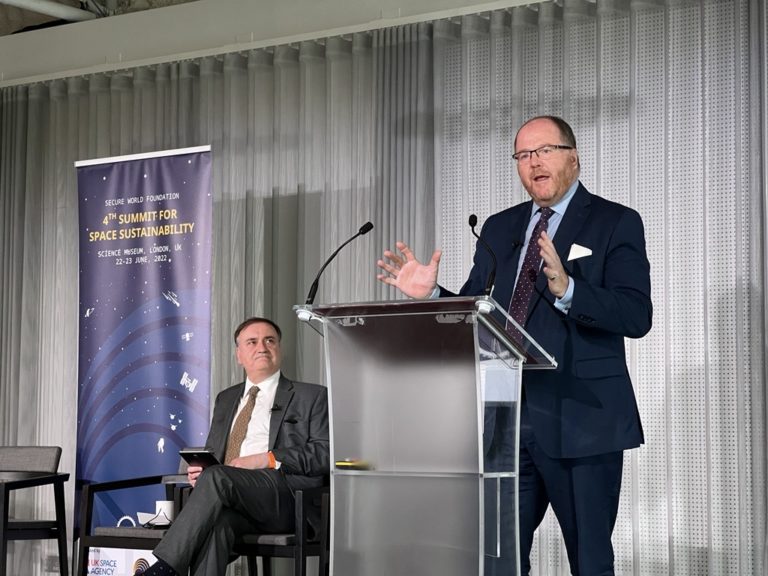UK Government Demonstrates International Leadership by Announcing Review of Space Legislation and Financial Support for Debris Removal Missions at Summit in London
London, UK, Thursday June 23 – The UK’s Department for Business, Energy and Industrial Strategy has announced today, during the 4th Summit on Space Sustainability, that it will begin to develop a number of initiatives to help protect our orbital environment. The UK government Plan for Space Sustainability includes a review of secondary legislation and associated regulations focussed on orbital constellations with a view to the update reflecting the huge growth in satellite constellations and the rapidly changing space environment. The Plan also placed more emphasis on the UK space system licensing process and associated third party liability insurance that will enable safe spacecraft operations and incentivise the sustainable use of space. The Plan highlighted a desire for UK leadership and an important confirmation of £5 million investment in Active Debris Removal, de-orbiting unprepared defunct satellites from space, and in-orbit servicing and manufacturing missions that Astroscale is competing for funding in the coming months.
“We welcome the government announcement to continue to invest in-orbit servicing and active debris removal missions through contributing to UK Space Agency and European Space Agency missions. This investment will provide tremendous opportunities to establish a UK leadership position, create jobs and commercialize this fast-growing sector.” said Nick Shave, Managing Director of Astroscale Ltd. “To realize Astroscale’s intention to make on-orbit servicing routine by 2030, we’re also very supportive of the UK government’s pledge to review secondary legislation with a view to regulatory reform that will compliment efforts driven by our international policy partners at CONFERS, IAF, GSOA, SSC, Paris Pearce Forum, World Economic Forum and UKspace.”
UK Science Minister George Freeman said, “A ‘Wild West’ space race without effective regulation risks a growing crisis of debris in space. That is why today I am announcing our Plan for Space Sustainability, a package of announcements which demonstrates the UK’s commitment to using our regulatory leadership. This Plan will ensure a safe and sustainable commercial space sector which rewards responsible satellite programs by lowering the costs of launch licenses and insurance for sustainable satellites and space missions.”
Today’s announcement also pledged to develop a new standard for space which will be designed to encompass existing guidelines and principles in relation to space sustainability, and fill the gaps in these standards and guidelines, seeking to develop best sustainability practice across the lifecycle of space activities. Astroscale, as Co-Chair of the In-Orbit Servicing and Manufacturing Working Group at UKspace, is proud to support the review and industry consultation in the coming months.
The partnership between UK government, industry, academia, legal and financial experts is expected to be delivered in collaboration with other international partners, providing multiple opportunities to align priorities for regulatory reform in the UK with other national and multi-lateral agendas.
“Harmonized regulations will shape how operators, especially large constellations, behave in orbit. They will also enable on-orbit services such as end-of-life and debris removal to thrive in a more certain regulatory environment,” said Charity Weeden, Vice President of Global Space Policy and Government Relations at Astroscale U.S.
“With the on-orbit servicing global economy estimated to reach $4.4 billion by 2030, the UK should invest in relevant space system technologies and target becoming a dominant space player globally in the On-Orbit Services and Manufacturing (OSAM) market with the objective of the UK capturing $1Bn of the global market by 2030,” Shave adds. “We need to act now to create a world class commercial and regulatory environment for operators and on-orbit servicing companies to thrive over the next decade.”
END

 Visit U.S. Site
Visit U.S. Site




